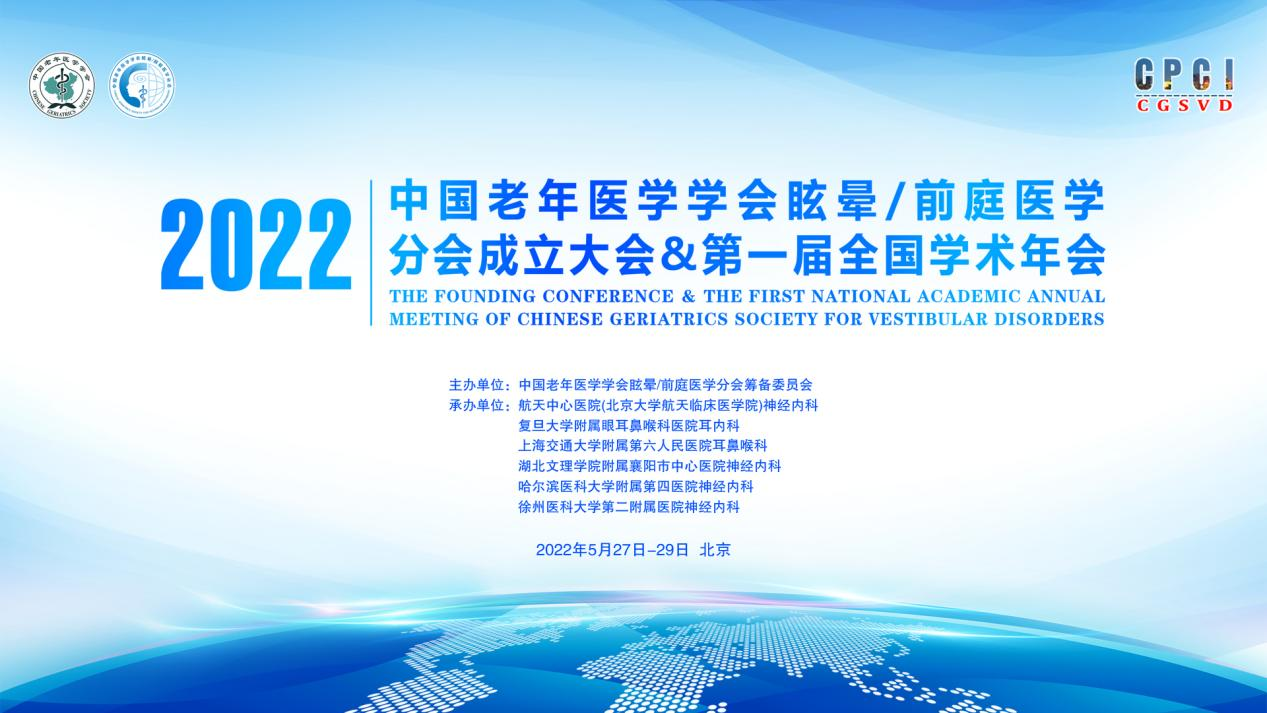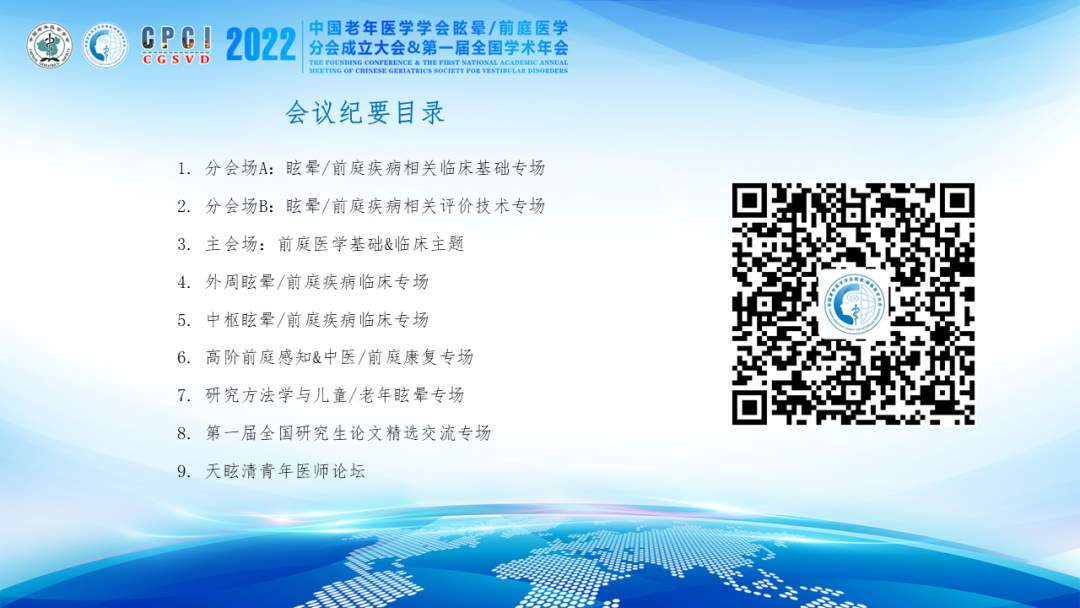The First National Academic Annual Meeting of Vertigo/Vestibular Medicine Branch of Chinese Geriatric Society Held in Beijing
On May 27-29, 2022, the ";First National Academic Annual Meeting of the Vertigo/Vestibular Medicine Branch of the Chinese Geriatric Society" was held in Beijing. President Yang Xu, Vice Presidents Rong Liangqun, Chang Liying and Fang Liqun co-served as executive chairmen of the first National Academic Conference. A total of 975 people participated in the online conference learning (including 537 registered members, 138 non-registered members and 300 non-registered students). 151 speakers and presiding experts (including 5 foreign speakers and 93 domestic speakers), including 62 academic lectures, 16 paper lectures, 12 case lectures and 8 satellite conferences; There are a total of 9 venues, including 1 main venue and 8 sub-venues.

The content of this annual meeting covers various subdivisions of vertigo/vestibular specialty, focusing on clinical and research focus issues of vertigo specialty, including peripheral and central vestibular basic & clinical medicine, vestibular neuroscience, vestibular ophthalmology, vestibular imaging, vestibular psychology, vestibular rehabilitation and vestibular disease research strategies, etc., and reflects the spirit of multi-disciplinary participation and pooling of strength. It's an academic feast for vertigo/vestibular medicine. The delegates listened carefully to the wonderful speeches of experts, and the academic atmosphere was strong, which generally reflected the benefits!
On May 27, 2022, a total of two sub-sessions were set up, including ";General Clinical Lecture and Special Lecture on Vertigo/Vestibular Diseases" and "Basic Knowledge of vertigo/Vestibular Diseases". Among them, a total of 9 experts from all over the country were invited to explain the interrogation techniques and bedside physical examination of patients with vertigo/vestibular diseases, the diagnosis and treatment requirements of peripheral and central vertigo/vestibular diseases, the anatomical physiology and imaging evaluation techniques of peripheral and central vestibular systems, and the pathways and mechanisms of vestibular eye reflex. "Basic Knowledge of Vertigo/Vestibular Diseases Special Session" invited 9 experts from all over the country to give in-depth explanations on the commonly used evaluation techniques of vertigo/vestibular diseases, including nymagmus view, HIMP-SHIMP, VEMP, audiology, pure tone audiometry, tympanical immobility, otoacoustic radiation, imaging, etc., so as to facilitate clinicians in the face of dizziness/vertigo patients. Be able to select the evaluation means with the target, and be able to interpret the inspection results correctly. On the evening of May 27, 2022, under the chairmanship of President Yang Xu, some experts exchanged and discussed the first draft of the Multidisciplinary Expert Consensus on the Diagnosis and Treatment of Vertigo/Vestibular Diseases and the Expert Consensus on Vestibular Rehabilitation Therapy.

On May 28, 2022, a total of 1 main venue and 3 sub-sessions were set up, including ";Basic vestibular Medicine & Clinical Topics", "Peripheral vertigo/Vestibular Disease Clinical Session", "Central vertigo/Vestibular disease Clinical session" and "Advanced vestibular Perception & Traditional Chinese Medicine/Vestibular Rehabilitation Special session". In the special session "Fundamentals of Vestibular Medicine & Clinical Topics";, Chief Physician Yang Xu, Director Wang Jing, Professor Kathleen Elizabeth Culllen, Professor Michael Strupp, Ji-Soo Professor Kim gave wonderful lectures on the topics of ";Thoughts and Prospects of vertigo/Vestibular diseases", "Indicators monitoring and mechanism research of vestibular compensation", "Role of gravity-inertia mechanism of otocalculus system in vestibular information processing", "senile dizziness and vertigo"; and "Assessment and differential diagnosis of acute spontaneous vertigo".
"Peripheral Vertigo/Vestibular Disease Clinical Special Session"; invited 9 experts to explain the contents of "genetic susceptibility, otitis media/labyrinthitis, immune and apnea related vertigo diseases, clinical application of otolithoscope, residual symptoms of BPPV, diagnostic criteria for Meniere's disease and sudden deafness at home and abroad, and development and problems of artificial vestibular transplantation";.
"Central Vertigo/Vestibular Disease Clinical Special Session" invited 9 experts to explain the basis of ophthalmyology, strabismus and diplopia and OTR identification, cerebellar vestibular anatomy and abnormal eye movement, Yaw/Pitch/Roll plane impairment and congenital nystagmus and visual pathway related nystagmus, PCI diagnosis and treatment strategy with vertigo, and clinical interpretation of stroke-related vestibular symptoms The application of small cerebral vascular disease and artificial intelligence in the diagnosis and treatment of vertigo.
"Advanced Vestibular Perception & Traditional Chinese Medicine/Vestibular Rehabilitation Special Session" invited 9 experts to explain the "vestibular cortex and central information processing, vestibular coordinate system, cognitive evaluation and rehabilitation of vertigo patients, subjective visual mechanism evaluation and application, advantages of traditional Chinese medicine treatment of vertigo, diagnosis and treatment principles, the development process of Chinese patent medicine guidelines, vestibular rehabilitation treatment progress and CBT treatment of vertigo. Clinical application for patients ".

On May 29, 2022, a total of three sub-sessions were set up, including "Research Methodology and Vertigo in children/the elderly", "The First National Graduate Student Paper Selection Exchange" and "Tianxuanqing Young Doctors Forum (Boutique case Sharing and expert Comments)". In the Special session on Research Methodology and Vertigo in Children/Old Age, A total of 9 experts explained the basic research methods of central vestibular diseases, the exploration of brain networks based on EEG signals, the application of bioinformatics in vestibular diseases, the analysis of BPPV biomarkers by proteomics technology, the etiology diagnosis and treatment of childhood vertigo, the related factors and treatment of postural regulation in the elderly, the method of establishing prediction models related to disease diagnosis and central blood Predictive tools for tubular vertigo ". In the First National Graduate Paper Exchange Session, 16 scholars from across the country reported on high-quality basic and clinical research related to vertigo/vestibular disease. In the "Tianxuanqing Young Doctors Forum (Boutique case sharing and expert comments)", 12 young doctors reported 12 wonderful cases for you.
During the conference, President Yang Xu presided over the first session of the Standing Committee of the Sub-committee, and more than 40 standing committee members launched a detailed discussion on the development of the society and discipline construction. Including how to carry out regular salon meetings, case discussion, scientific research ideas and guide interpretation; How to further carry out multi-center training, remote guidance, including joint training of students, postgraduates, visiting scholars, etc. Finally, President Yang Xu expressed his sincere thanks to all members of the Standing Committee for their suggestions and suggestions, and hoped that we could work together to build a high-level academic exchange platform, broaden the channels of multi-disciplinary collaboration, and accelerate the rapid development of vertigo/vestibular medicine in China.


